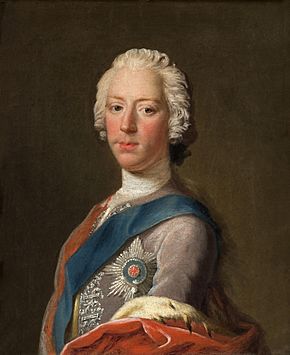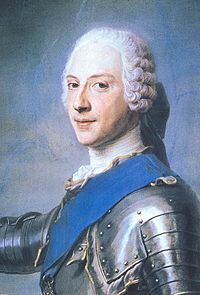Lost portrait of Charles Edward Stuart facts for kids
Quick facts for kids The Lost Portraitof Charles Edward Stuart |
|
|---|---|
 |
|
| Artist | Allan Ramsay |
| Year | 1745 |
| Medium | Oil on canvas |
| Dimensions | 30 cm × 25 cm (12 in × 10 in) |
| Location | Scottish National Portrait Gallery |
The "lost portrait" of Charles Edward Stuart is a painting from 1745. It shows Charles Edward Stuart, often called the Young Pretender or Bonnie Prince Charlie. The Scottish artist Allan Ramsay painted it in late 1745.
This painting was found by art expert Bendor Grosvenor. He discovered it at Gosford House, a large home near Edinburgh. Duncan Thomson, a top expert on Ramsay and former Director of the Scottish National Portrait Gallery, confirmed it was real. The painting is now kept at the Scottish National Portrait Gallery.
Contents
Finding the Lost Portrait
A Case of Mistaken Identity
For many years, the most famous portrait of Charles Edward Stuart was a large drawing made with pastels. A pastel is like a crayon, but made of powdered pigment. This drawing was by a French artist named Maurice Quentin de La Tour. It had been displayed at the Scottish National Portrait Gallery since 1994.
However, in 2009, art expert Bendor Grosvenor made an important discovery. He found out that the pastel portrait was not of Charles Edward Stuart at all! It was actually of Charles's younger brother, Henry Benedict Stuart. This was a big surprise because the pastel portrait was very well known. It had appeared on many things, like shortbread tins and book covers.

The Search for the Real Portrait
Bendor Grosvenor wanted to find a true portrait of Charles Edward Stuart from the time of the Jacobite rising of 1745. This was a time when Charles tried to take back the British throne for his family, the Stuarts.
During his search, Grosvenor found an old letter in the Royal Archives. The letter was from John Stuart, Charles's personal helper. It asked artist Allan Ramsay to come to Holyrood Palace in Edinburgh to paint Charles's picture. The letter was dated October 26, 1745. This proved that Ramsay had painted Charles from real life.
Discovery at Gosford House
Grosvenor also found an old black and white photo of a painting in the records of the National Portrait Gallery in London. The photo didn't say who the artist was. This painting was at Gosford House, the home of the Earl of Wemyss. It had been hanging in a dark hallway for 250 years. People knew it was a portrait of Charles, but they didn't know Allan Ramsay had painted it.
Duncan Thomson, a leading expert on Ramsay, confirmed that the painting was indeed by Allan Ramsay. He said that finding this portrait was very important. It was painted in Scotland by a Scottish artist and truly brought the prince to life.
Joining the National Collection
On March 30, 2016, the Scottish National Portrait Gallery announced they had bought the painting. It was valued at over £1.1 million. The painting was put on display just before the 270th anniversary of the Battle of Culloden. This battle was a major event in the Jacobite rising.
About the Painting
This small painting, measuring 12 by 10 inches (30 by 25 centimetres), is very special. It is the only known portrait of Charles Edward Stuart that was painted in Britain.
The painting was meant to be taken to England. If the Jacobites had won and put the Stuarts back on the throne, this painting would have been used for official royal portraits. It would also have been copied into many prints.
Christopher Baker, the director of the Scottish National Portrait Gallery, explained its importance. He said it was a "little gem" of a picture. Its small size meant it could easily be copied into prints. These prints would then be spread widely to support the Jacobite cause across Britain and Europe.
The BBC Documentary
The story of Bendor Grosvenor's search and discovery of the painting was made into a BBC documentary. It was called The Lost Portrait of Bonnie Prince Charlie. The show was broadcast on BBC Two on February 22, 2014.
 | Calvin Brent |
 | Walter T. Bailey |
 | Martha Cassell Thompson |
 | Alberta Jeannette Cassell |

